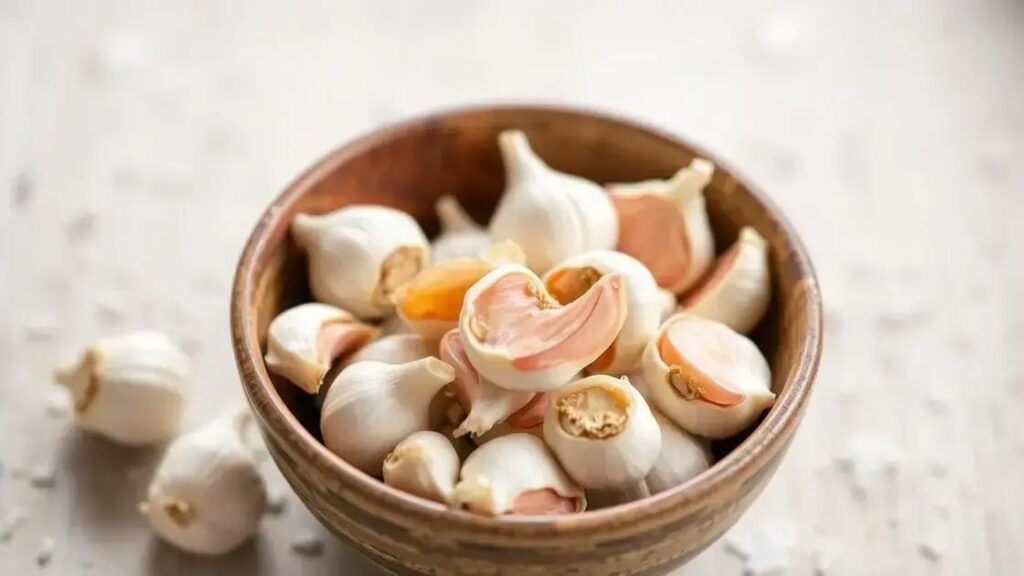Garlic is beneficial for heart health, helping to lower blood pressure, reduce cholesterol levels, and improve circulation. Incorporate it into your diet through raw consumption, cooking, or recipes like garlic lemon chicken and roasted vegetables. However, be cautious of allergies and medication interactions, and consult your healthcare provider if needed.
Are you looking for a natural way to improve your heart health? How to use garlic for better heart health is an essential topic for anyone interested in natural remedies. Garlic has been praised for centuries due to its impressive health benefits, particularly for heart health. In this article, we’ll explore the various benefits of garlic, how you can incorporate it into your diet, delicious recipes featuring garlic, and necessary precautions to take when using it for better heart health.
The Heart Health Benefits of Garlic
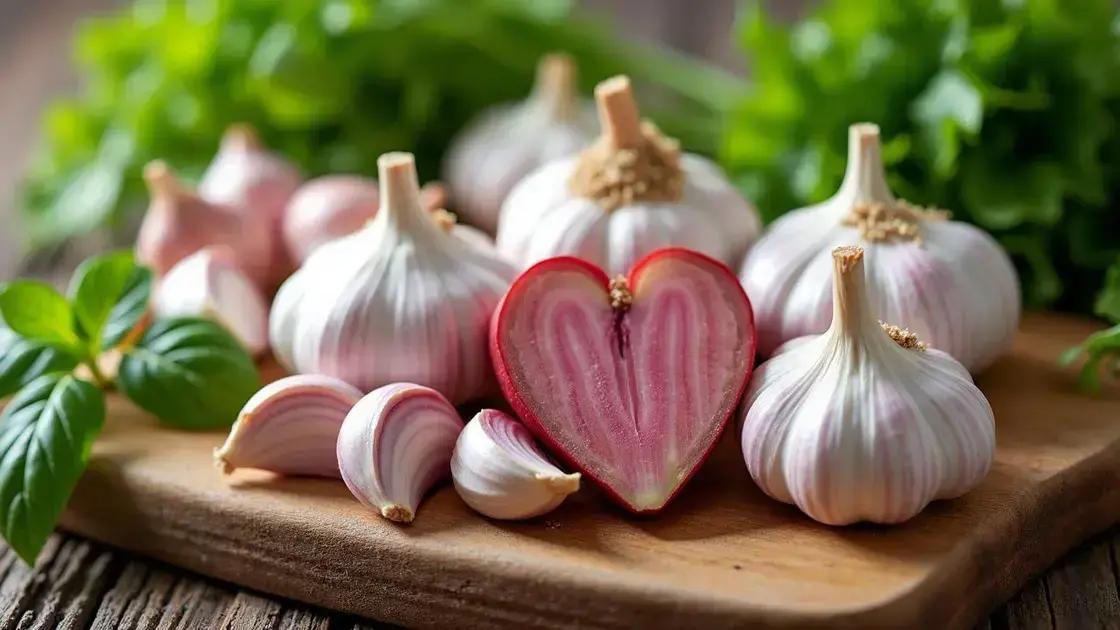
Garlic is more than just a flavorful addition to meals; it offers numerous heart health benefits that make it an essential ingredient for maintaining cardiovascular well-being. Studies have shown that garlic can contribute to lowering blood pressure and reducing cholesterol levels, both of which are vital for a healthy heart.
Lowering Blood Pressure
Research indicates that garlic can help to lower blood pressure in individuals with hypertension. The active compound in garlic, allicin, is believed to have a significant effect on the body’s blood vessels, promoting vasodilation, which helps to widen blood vessels and improve blood flow. This can result in reduced pressure on the cardiovascular system.
Reducing Cholesterol Levels
Garlic is also effective in lowering levels of LDL cholesterol, often referred to as “bad” cholesterol. High LDL cholesterol can lead to plaque buildup in the arteries and increased risk of heart disease. Incorporating garlic into your diet can help maintain a healthy balance of cholesterol levels, thereby promoting overall heart health.
Antioxidant Properties
Additionally, garlic has strong antioxidant properties, which can combat oxidative stress in the body. Oxidative stress can damage cells in the heart and contribute to various heart diseases. By consuming garlic regularly, you can enhance your body’s ability to fight inflammation and protect your heart over time.
Improving Circulation
Garlic may also boost circulation. Improved blood circulation is crucial for delivering oxygen and nutrients throughout the body while also assisting in the proper functioning of the heart. Better circulation not only enhances overall health but also helps in reducing the risk of arterial blockages.
How to Incorporate Garlic into Your Diet
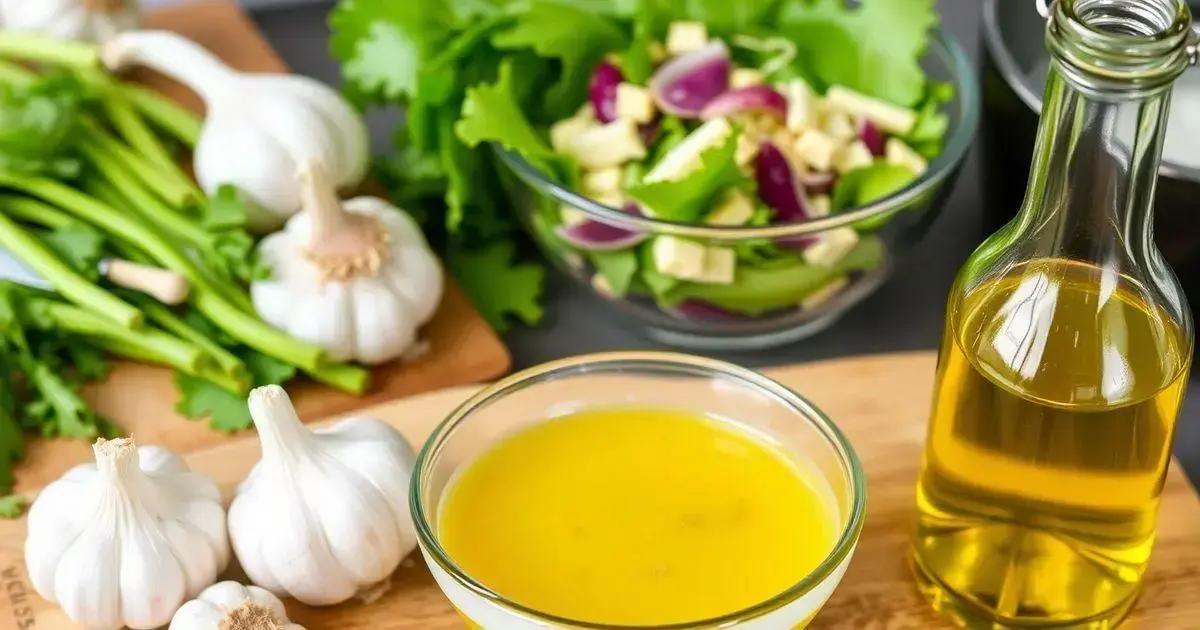
Incorporating garlic into your diet can be easy and delicious. Here are some simple ways to make garlic a regular part of your meals:
Add Raw Garlic to Dishes
One of the simplest ways to enjoy the health benefits of garlic is to add it raw to meals. Finely chop or crush garlic cloves and toss them into salads, dressings, or dips. Raw garlic delivers the maximum health benefits and adds a rich flavor to your food.
Cook with Garlic
Garlic can be used in various cooked dishes. Sauté minced garlic in olive oil for a tasty base for pasta sauces, stir-fries, or soups. Just remember to use low heat to preserve some of the beneficial compounds in the garlic.
Include Garlic in Marinades
Garlic is perfect for flavoring meats and vegetables. Use minced garlic in marinades for chicken, fish, or veggies. Combine garlic with lemon juice, herbs, and olive oil for a delicious marinade that infuses flavor and nutrition.
Make Garlic Infused Oils
Garlic-infused oil is a simple way to add flavor to many dishes. Combine fresh garlic with olive oil and let it sit for a few days. Use this oil as a dressing or drizzled over cooked dishes for an aromatic flavor boost.
Experiment with Garlic Powders
If fresh garlic is not available, consider using garlic powder. It works well in many recipes like spice blends, soups, and roasted vegetables. Just use it sparingly, as it has a stronger flavor than fresh garlic.
Garlic Recipes for Heart Health
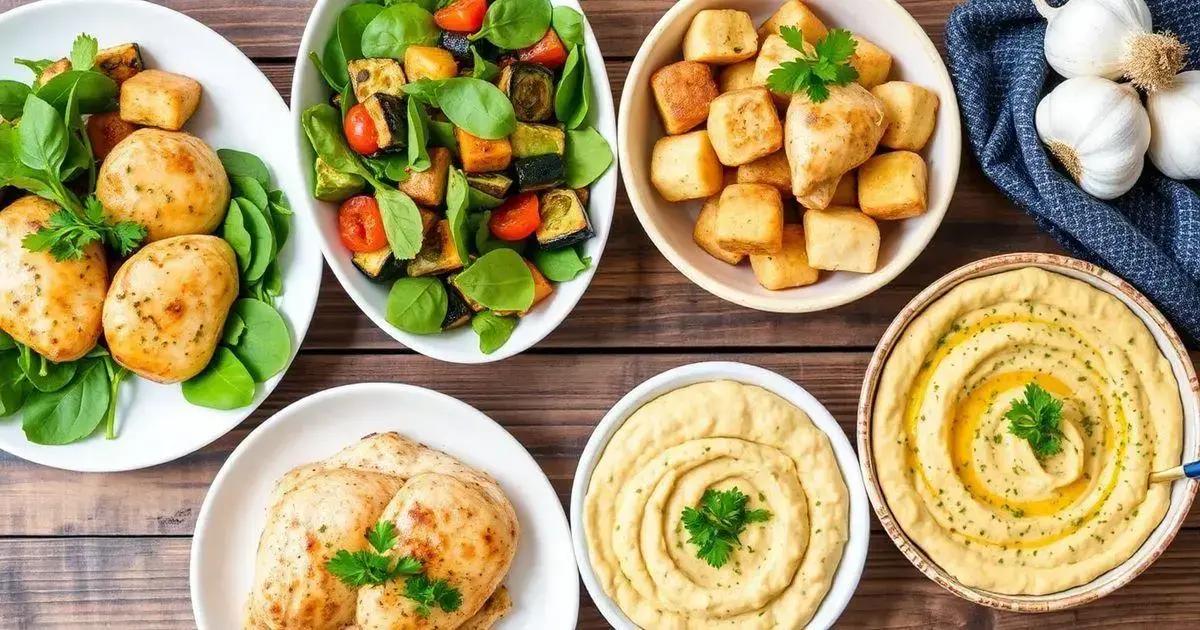
Incorporating garlic into heart-healthy recipes can be easy and tasty. Here are some delicious garlic recipes that promote heart health:
Garlic Lemon Chicken
This flavorful dish combines garlic and lemon for a zesty experience. Ingredients: 4 chicken breasts, 4 cloves of garlic (minced), juice of 2 lemons, 2 tablespoons of olive oil, salt, and pepper. Instructions: Marinate chicken in garlic, lemon juice, olive oil, salt, and pepper for at least 30 minutes. Grill or bake until cooked through.
Garlic Roasted Vegetables
This simple and healthy side dish is packed with flavor. Ingredients: 2 cups of your favorite vegetables (like broccoli, carrots, and bell peppers), 4 cloves of garlic (sliced), 2 tablespoons of olive oil, salt, and pepper. Instructions: Toss the vegetables with garlic, olive oil, salt, and pepper. Roast at 400°F (200°C) for 20-25 minutes or until tender.
Garlic Spinach Salad
Perfect as a light meal or side, this salad is nutrient-rich. Ingredients: 4 cups fresh spinach leaves, 2 cloves garlic (minced), 1 tablespoon olive oil, 1 tablespoon balsamic vinegar, salt, and pepper. Instructions: In a small bowl, whisk together olive oil, balsamic vinegar, garlic, salt, and pepper. Drizzle over spinach and toss gently.
Garlic Hummus
Hummus is a great snack that features garlic. Ingredients: 1 can of chickpeas (drained), 2 cloves garlic (minced), 1/4 cup tahini, juice of 1 lemon, 2 tablespoons olive oil, salt, and water as needed. Instructions: Combine all ingredients in a food processor. Blend until smooth, adding water for desired consistency. Serve with veggies or whole-grain pita.
Precautions When Using Garlic for Health
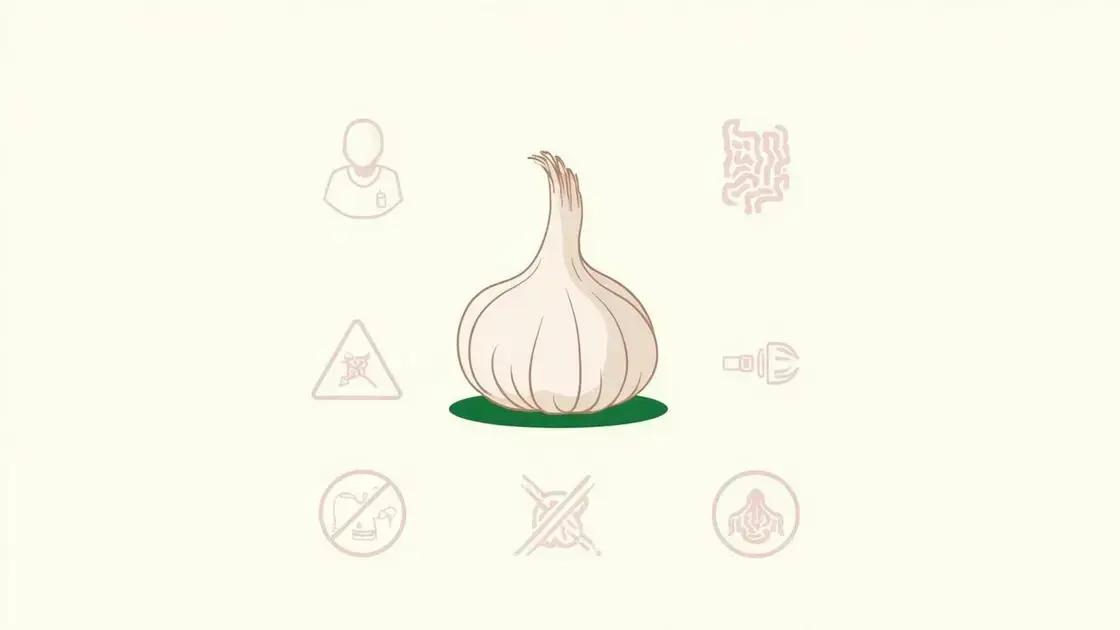
Using garlic is generally safe, but there are some precautions to consider to ensure it benefits your health. Understanding these will help you maximize its advantages while minimizing potential risks.
Allergies and Sensitivities
Some people may have allergies or sensitivities to garlic. Symptoms can include skin rashes, digestive issues, or respiratory problems. If you experience any of these symptoms after consuming garlic, discontinue use and consult a healthcare professional.
Medication Interactions
Garlic can interact with certain medications, such as blood thinners like warfarin. It can enhance their effects, increasing the risk of bleeding. Always talk to your healthcare provider before adding garlic supplements to your routine, especially if you are on medication.
Digestive Issues
Consuming large amounts of garlic may lead to digestive discomfort, including gas, bloating, or an upset stomach. If you experience these issues, try reducing your garlic intake or consulting a nutritionist for guidance.
Pregnancy and Breastfeeding
While garlic in food amounts is safe during pregnancy and breastfeeding, high doses from supplements may not be. Always consult with a healthcare provider before taking garlic supplements if you are pregnant or nursing.
Proper Storage
To maintain its health benefits, always store garlic properly. Keep it in a cool, dark place, ideally in a mesh bag or container that allows airflow. Avoid storing it in the fridge, as this can lead to sprouting.
Incorporating Garlic for Better Heart Health
Garlic is a powerful ally in promoting heart health and overall well-being. By including it in your daily diet, you can take advantage of its numerous health benefits, from lowering cholesterol levels to reducing blood pressure.
While enjoying garlic, it is important to be aware of precautions, especially regarding allergies and potential interactions with medications. Always consult with a healthcare provider when making significant changes to your diet or if you have health concerns.
Whether you prefer raw garlic, cooked dishes, or garlic-infused oils, finding ways to incorporate this flavorful ingredient into your meals can lead to a healthier lifestyle. Remember to embrace garlic as part of a balanced diet for a happy and healthy heart.
FAQ – Frequently Asked Questions about Garlic and Heart Health
What are the heart health benefits of garlic?
Garlic can help lower blood pressure, reduce cholesterol levels, and improve overall circulation, making it a great choice for heart health.
How can I incorporate garlic into my diet?
You can add raw garlic to salads, include it in marinades, cook with it in dishes, or make garlic-infused oils to enjoy its benefits.
Are there any precautions I should take when using garlic?
Yes, be aware of potential allergies, interactions with medications, and digestive issues. Always consult your healthcare provider if you have concerns.
Can I consume garlic during pregnancy?
While garlic in food amounts is generally safe during pregnancy, high doses from supplements should be discussed with your healthcare provider.
What are some heart-healthy garlic recipes?
Try garlic lemon chicken, garlic roasted vegetables, garlic spinach salad, and garlic hummus for delicious ways to incorporate garlic into your meals.
How should I store garlic to maintain its freshness?
Store garlic in a cool, dark place in a mesh bag or container that allows airflow. Avoid storing it in the fridge to prevent sprouting.

